
New Releases Tuesday: The Best Books Out This Week
It’s Tuesday, which means it’s time for a new batch of book releases! Here are a few of the books out today you should add to your TBR. This is a very small percentage of the new releases this week, as well as a few others you may have missed from recent weeks. Make sure to stick around until the end for some more Book Riot resources for keeping up with new books. The book descriptions listed are the publisher’s, unless otherwise noted.

Constructing a Nervous System by Margo Jefferson
The award-winning critic and memoirist Margo Jefferson has lived in the thrall of a cast of others—her parents and maternal grandmother, jazz luminaries, writers, artists, athletes, and stars. These are the figures who thrill and trouble her, and who have made up her sense of self as a person and as a writer. In her much-anticipated follow-up to Negroland, Jefferson brings these figures to life in a memoir of stunning originality, a performance of the elements that comprise and occupy the mind of one of our foremost critics.
In Constructing a Nervous System, Jefferson shatters her self into pieces and recombines them into a new and vital apparatus on the page, fusing the criticism that she is known for, fragments of the family members she grieves for, and signal moments from her life, as well as the words of those who have peopled her past and accompanied her in her solitude, dramatized here like never before. Bing Crosby and Ike Turner are among the author’s alter egos. The sounds of a jazz LP emerge as the intimate and instructive sounds of a parent’s voice. W. E. B. Du Bois and George Eliot meet illicitly. The muscles and movements of a ballerina are spliced with those of an Olympic runner, becoming a template for what a black female body can be.
The result is a wildly innovative work of depth and stirring beauty. It is defined by fractures and dissonance, longing and ecstasy, and a persistent searching. Jefferson interrogates her own self as well as the act of writing memoir, and probes the fissures at the center of American cultural life.
Reasons to read it: Jefferson has been writing about American culture since the ’70s, when she brought Elvis to task for appropriation. Since then, she’s been regarded as “one of our most nuanced thinkers on the intersections of race, class, and feminism” (Cathy Park Hong, author of Minor Feelings). Here, she offers a book that is part memoir, part analysis of music and literature, and totally unique. By analyzing the impact of and inspirations behind literary and musical icons’ that have shaped her and placing them next to her own experiences, she shows just how much culture — and all that influences it, like race, gender, and class — has on the forming of our identities.
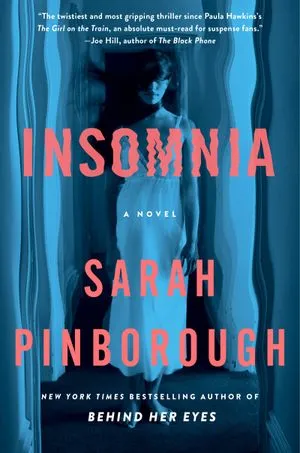
Insomnia by Sarah Pinborough
In this twisty, mind-bending thriller from the bestselling author of Behind Her Eyes, Emma Averell worries that her crippling insomnia is a sign that she’s slowly going insane—like the mother she’s worked so hard to leave in her past.
Emma Averell loves her life—her high-powered legal career, her two beautiful children, and her wonderful stay-at-home husband—but it wasn’t always so perfect. When she was just five years old, Emma and her older sister went into foster care because of a horrific incident with their mother. Her sister can remember a time when their mother was loving and “normal,” but Emma can only remember her as one thing—a monster. And that monster emerged right around their mother’s fortieth birthday, the same age Emma is approaching now.
Emma desperately wants to keep her successful life separate from her past, so she has always hidden her childhood trauma. But then she’s unable to sleep, and now losing time during the day, also one of the first symptoms her mother showed. Is the madness in her blood, just as her mother predicted? Could she end up hurting her family in her foggy, frenetic state? Or is she truly beginning to lose her mind?
Reasons to read it: For a book that’ll keep you guessing with quite the unreliable narrator. When Emma gets roped into a murder case, Pinborough ratchets up feelings of dread and a kind of claustrophobia as the main character tries to figure out what’s really going on. This is a page turner with an ending you probably won’t see coming.
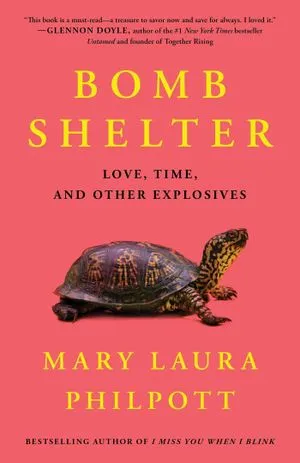
Bomb Shelter: Love, Time, and Other Explosives by Mary Laura Philpott
A lifelong worrier, Philpott always kept an eye out for danger, a habit that only intensified when she became a parent. But she looked on the bright side, too, believing that as long as she cared enough, she could keep her loved ones safe.
Then, in the dark of one quiet, pre-dawn morning, she woke abruptly to a terrible sound—and found her teenage son unconscious on the floor. In the aftermath of a crisis that darkened her signature sunny spirit, she wondered: If this happened, what else could happen? And how do any of us keep going when we can’t know for sure what’s coming next?
Leave it to the writer whose critically acclaimed debut had us “laughing and crying on the same page” (NPR) to illuminate what it means to move through life with a soul made of equal parts anxiety and optimism (and while she’s at it, to ponder the mysteries of backyard turtles and the challenges of spatchcocking a turkey).
Reasons to read it: For a book that feels like a chat with a friend. Philpott balances talking about the fears and stresses of everyday life — like discovering her son has epilepsy and the resulting worry about her family — with humor and comforting optimism. What she writes about in her essays can seem a little random at times, ranging from jokes about the NextDoor app to how her dad worked at an underground military bunker, but this adds to the quirkiness of her musings.
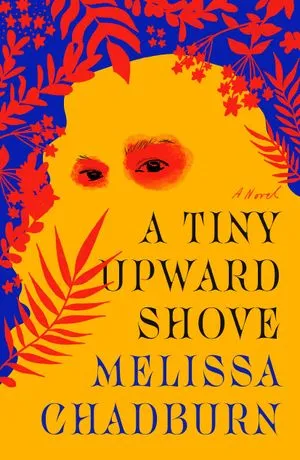
A Tiny Upward Shove by Melissa Chadburn
My grandmother, sitting at her doily-covered table, marmalade on her cheek, explained that the aswang is all the evil bad things that a town or a society would want to deny— eventually it has to come out, has to be personified into something or the truth will reveal itself.
Marina Salles’s life does not end the day she wakes up dead.
Instead, in the course of a moment, she is transformed into the stuff of myth, the stuff of her grandmother’s old Filipino stories–an aswang. She spent her life on the margins, knowing very little about her own life, let alone the lives of others; she was shot like a pinball through a childhood of loss, a veteran of Child Protective Services and a survivor, but always reacting, watching from a distance. Death brings her into the hearts and minds of those she has known–even her killer–as she is able to access their memories and to see anew the meaning of her own. In the course of these pages she traces back through her life, finally able to see what led these lost souls to this crushingly inevitable conclusion.
In A Tiny Upward Shove, the debut novelist Melissa Chadburn charts the heartbreaking journeys of two of society’s cast-offs as they find their way to each other and their roles as criminal and victim. What does it mean to be on the brink? When are those moments that change not only our lives but our very selves? And how, in this impossible world, can we rouse ourselves toward mercy?
Reasons to read it: We don’t talk about the lives of victims of murders enough, but Chadburn is rectifying that here. She bases Marina’s tragic story on being the last victim of real-life serial killer Willie Pickton, who confessed to killing 49 women — many of them Indigenous — over a couple of decades in Canada. Chadburn’s writing is beautiful at times as she guides us through a very heartbreaking tale of child abuse, drug abuse, and the broken foster care system. Lauren Groff, author of Matrix, has said it’s “gloriously voiced, the kind of addictive and headlong novel that makes reading into a wild bronco ride.”
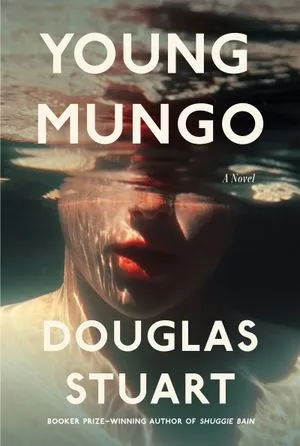
Young Mungo by Douglas Stuart
A story of queer love and working-class families, Young Mungo is the brilliant second novel from the Booker Prize-winning author of Shuggie Bain.
Douglas Stuart’s first novel Shuggie Bain, winner of the 2020 Booker Prize, is one of the most successful literary debuts of the century so far. Published or forthcoming in forty territories, it has sold more than one million copies worldwide. Now Stuart returns with Young Mungo, his extraordinary second novel. Both a page-turner and literary tour de force, it is a vivid portrayal of working-class life and a deeply moving and highly suspenseful story of the dangerous first love of two young men.
Growing up in a housing estate in Glasgow, Mungo and James are born under different stars—Mungo a Protestant and James a Catholic—and they should be sworn enemies if they’re to be seen as men at all. Yet against all odds, they become best friends as they find a sanctuary in the pigeon dovecote that James has built for his prize racing birds. As they fall in love, they dream of finding somewhere they belong, while Mungo works hard to hide his true self from all those around him, especially from his big brother Hamish, a local gang leader with a brutal reputation to uphold. And when several months later, Mungo’s mother sends him on a fishing trip to a loch in Western Scotland with two strange men whose drunken banter belies murky pasts, he will need to summon all his inner strength and courage to try to get back to a place of safety, a place where he and James might still have a future.
Imbuing the everyday world of its characters with rich lyricism and giving full voice to people rarely acknowledged in the literary world, Young Mungo is a gripping and revealing story about the bounds of masculinity, the divisions of sectarianism, the violence faced by many queer people, and the dangers of loving someone too much.
Reasons to read it: Stuart has mentioned how he felt a disconnect from queer literature because it only seemed to focus on the middle class. With this book, he shows another side of queer life and self-discovery with well-crafted characters and great dialogue. Be forewarned, though: it will have your heart in a vice grip. As much as it’s a tender story of two boys finding each other, it’s about violence and toxic masculinity, too.
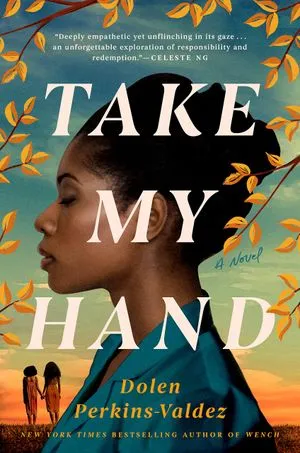
Take My Hand by Dolen Perkins-Valdez
Inspired by true events that rocked the nation, a profoundly moving novel about a Black nurse in post-segregation Alabama who blows the whistle on a terrible wrong done to her patients, from the New York Times bestselling author of Wench.
Montgomery, Alabama 1973. Fresh out of nursing school, Civil Townsend has big plans to make a difference, especially in her African American community. At the Montgomery Family Planning Clinic, she intends to help women make their own choices for their lives and bodies.
But when her first week on the job takes her down a dusty country road to a worn down one-room cabin, she’s shocked to learn that her new patients are children—just 11 and 13 years old. Neither of the Williams sisters has even kissed a boy, but they are poor and Black and for those handling the family’s welfare benefits that’s reason enough to have the girls on birth control. As Civil grapples with her role, she takes India, Erica, and their family into her heart. Until one day, she arrives at the door to learn the unthinkable has happened and nothing will ever be the same for any of them.
Decades later, with her daughter grown and a long career in her wake, Dr. Civil Townsend is ready to retire, to find her peace and to leave the past behind. But there are people and stories that refuse to be forgotten.That must not be forgotten.
Because history repeats what we don’t remember.
Reasons to read it: Valdez makes a historical horror more personable with Civil’s story of fighting against the U.S.’s attempt of forced sterilization of Black people. The story is told as an older Civil recounts her younger years as a nurse to her daughter, admitting all her mistakes and the resultant guilt. Take My Hand is both eye-opening and engaging.
Other Book Riot New Releases Resources
- All the Books, our weekly new releases podcast, where Liberty and a cast of co-hosts talk about eight books out that week that we’ve read and loved.
- The New Books Newsletter, where we send you an email of the books out this week that are getting buzz.
- Finally, if you want the real inside scoop on new releases, you have to check out Book Riot Insiders’ New Releases Index! That’s where I find 90% of new releases, and you can filter by trending books, Rioters’ picks, and even LGBTQ new releases!







